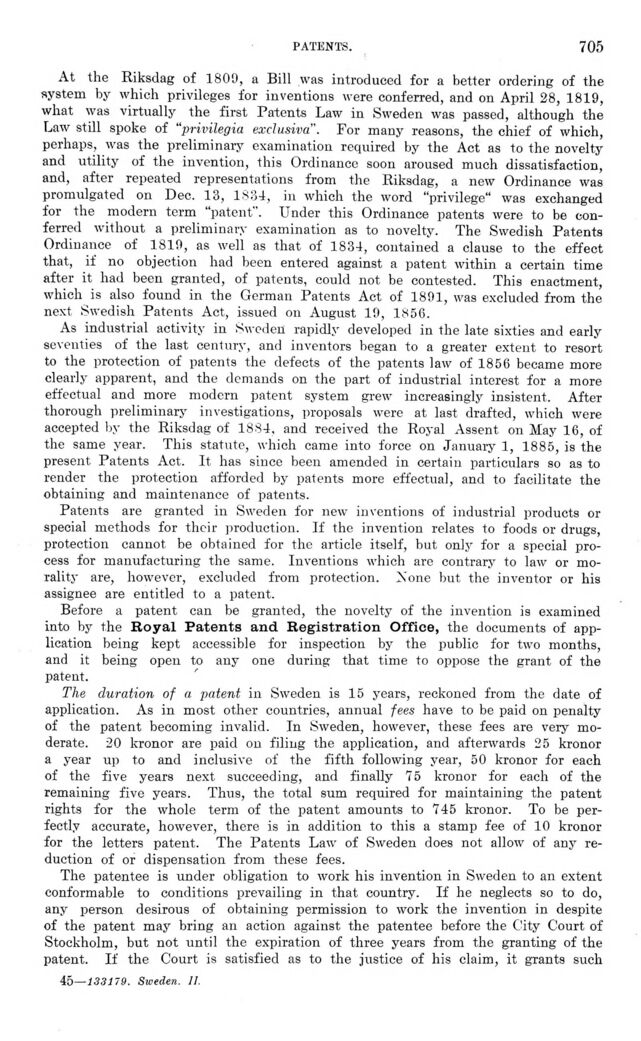
Full resolution (JPEG) - On this page / på denna sida - XII. Synopsis of Trade and Industrial Legislation. By J. Tjerneld - Patents. By Nils Rahm

<< prev. page << föreg. sida << >> nästa sida >> next page >>
Below is the raw OCR text
from the above scanned image.
Do you see an error? Proofread the page now!
Här nedan syns maskintolkade texten från faksimilbilden ovan.
Ser du något fel? Korrekturläs sidan nu!
This page has been proofread at least once.
(diff)
(history)
Denna sida har korrekturlästs minst en gång.
(skillnad)
(historik)
At the Riksdag of 1809, a Bill was introduced for a better ordering of the
system by which privileges for inventions were conferred, and on April 28, 1819,
what was virtually the first Patents Law in Sweden was passed, although the
Law still spoke of "privilegia exclusiva". For many reasons, the chief of which,
perhaps, was the preliminary examination required by the Act as to the novelty
and utility of the invention, this Ordinance soon aroused much dissatisfaction,
and, after repeated representations from the Riksdag, a new Ordinance was
promulgated on Dec. 13, 1834, in which the word "privilege" was exchanged
for the modern term "patent". Under this Ordinance patents were to be
conferred without a preliminary examination as to novelty. The Swedish Patents
Ordinance of 1819, as well as that of 1834, contained a clause to the effect
that, if no objection had been entered against a patent within a certain time
after it had been granted, of patents, could not be contested. This enactment,
which is also found in the German Patents Act of 1891, was excluded from the
next Swedish Patents Act, issued on August 19, 1856.
As industrial activity in Sweden rapidly developed in the late sixties and early
seventies of the last century, and inventors began to a greater extent to resort
to the protection of patents the defects of the patents law of 1856 became more
clearly apparent, and the demands on the part of industrial interest for a more
effectual and more modern patent system grew increasingly insistent. After
thorough preliminary investigations, proposals were at last drafted, which were
accepted by the Riksdag of 1884, and received the Royal Assent on May 16, of
the same year. This statute, which came into force on January 1, 1885, is the
present Patents Act. It has since been amended in certain particulars so as to
render the protection afforded by patents more effectual, and to facilitate the
obtaining and maintenance of patents.
Patents are granted in Sweden for new inventions of industrial products or
special methods for their production. If the invention relates to foods or drugs,
protection cannot be obtained for the article itself, but only for a special
process for manufacturing the same. Inventions which are contrary to law or
morality are, however, excluded from protection. None but the inventor or his
assignee are entitled to a patent.
Before a patent can be granted, the novelty of the invention is examined
into by the Royal Patents and Registration Office, the documents of
application being kept accessible for inspection by the public for two months,
and it being open to any one during that time to oppose the grant of the
patent.
The duration of a patent in Sweden is 15 years, reckoned from the date of
application. As in most other countries, annual fees have to be paid on penalty
of the patent becoming invalid. In Sweden, however, these fees are very
moderate. 20 kronor are paid on filing the application, and afterwards 25 kronor
a year up to and inclusive of the fifth following year, 50 kronor for each
of the five years next succeeding, and finally 75 kronor for each of the
remaining five years. Thus, the total sum required for maintaining the patent
rights for the whole term of the patent amounts to 745 kronor. To be
perfectly accurate, however, there is in addition to this a stamp fee of 10 kronor
for the letters patent. The Patents Law of Sweden does not allow of any
reduction of or dispensation from these fees.
The patentee is under obligation to work his invention in Sweden to an extent
conformable to conditions prevailing in that country. If he neglects so to do,
any person desirous of obtaining permission to work the invention in despite
of the patent may bring an action against the patentee before the City Court of
Stockholm, but not until the expiration of three years from the granting of the
patent. If the Court is satisfied as to the justice of his claim, it grants such
<< prev. page << föreg. sida << >> nästa sida >> next page >>